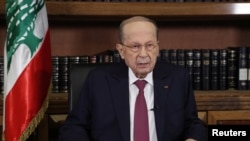Lebanese President Michel Aoun, a Maronite Christian, and Hezbollah have shaped Lebanon’s politics for 16 years. He warned that an 11-week parliamentary boycott has kept the government from meeting and undermined state institutions amid the country’s economic meltdown. But he fell short of directly criticizing his ally Hezbollah and the Shi’ite Amal party in his televised speech on Monday night.
Both have blocked Cabinet meetings since October over their demands for the dismissal of Judge Tarek Bitar, who is investigating the Beirut port explosion that killed more than 200 people in August 2020.
So far, no one has been held accountable for the incident, which was one of the largest non-nuclear explosions in history. Hezbollah and Amal accuse Bitar of bias, but observers say he is just doing his job by questioning ministers responsible for the port at the time. The probe has been suspended for a fourth time.
Lebanese analyst Dania Koleilat Khatib with the Issam Fares Institute at the American University of Beirut told VOA that Aoun failed to convince the Lebanese people he can effectively confront Hezbollah and Amal.
“They’re trying to sideline Bitar, so he doesn’t have any power to question ministers. Aoun has a dilemma. His political position by supporting Hezbollah is costing him a lot of popularity. But if he breaks with Hezbollah, who will finance him? Where will he get money? He doesn’t have any sources to get money. So, he tries to make this speech where he says: I want law, I want the state, but he gives the country to Hezbollah on a silver plate,” Khatib said.
Hezbollah wields considerable political and military influence in Lebanon. It’s the only militia to have held on to its weapons since the end of the 1975-1990 civil war.
Aoun’s presidency ends in 2022. His unpopular son-in-law, Gebran Bassil, leader of the Free Patriotic Movement party, or FPM, wants the job.
"The FPM is stuck between a rock and a hard place today,” Karim Emile Bitar, of Beirut's Saint Joseph University, told the Reuters news agency. “They certainly realize that the Christian street no longer condones any form of acquiescence to Hezbollah's demands," said Bitar, who directs the university’s Institute of Political Science.
"But they simply cannot afford to completely let go of this alliance because it would ruin Bassil's presidential ambitions and would certainly prevent them from getting a significant parliamentary bloc," he said.
Analyst Khatib said many Lebanese Christian voters are now anxious to support independent civil society candidates or Samir Geagea, who leads the Lebanese Forces political party, and opposes Hezbollah and the Free Patriotic Movement.




